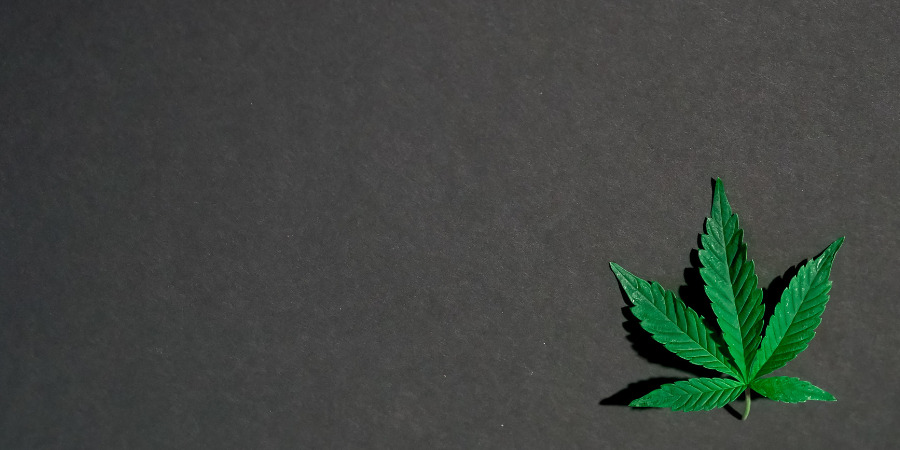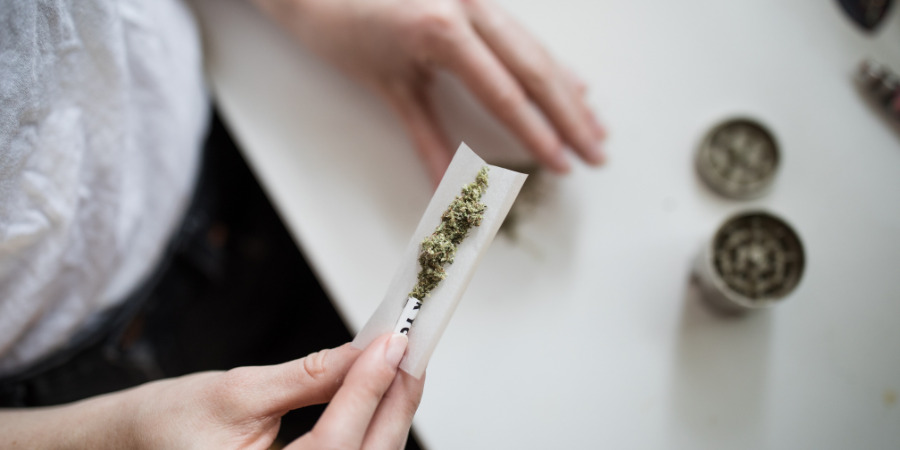Last Updated:
September 18th, 2025

Cannabis is one of the most commonplace drugs used in the country. Data shows that as many as 7.6% of adults in the UK (2.5 million people) reported using cannabis in the last 12 months.
Yet most people are unaware of the psychological changes that take place with frequent cannabis use, including worsening mental health and a propensity towards aggression.
What are cannabis’s effects?
Cannabis is a substance with over one hundred compounds called cannabinoids. Of these, two are seen as the most influential and cause a range of effects on our bodies when ingested: tetrahydrocannabinol (THC) and cannabidiol (CBD). The most common way to use cannabis is through smoking, though it can also be mixed into food or drinks.
THC is the main compound that creates the euphoric “high” when a person smokes cannabis or eats a cannabis-infused product, like a brownie, cake, or cookie. Research demonstrates that THC affects the brain’s reward system by attaching to cannabinoid receptors and creating euphoric sensations. Common effects from THC include feelings of relaxation, an altered perception of time and more intense sensations of taste or smell.
CBD is considered to be a non-intoxicating compound in marijuana. Research suggests that CBD does not generally lead to cannabis addiction or induce serious side effects, though it may modulate symptoms of certain psychiatric disorders. However, scientific evidence remains inconclusive.
Can cannabis use cause anger or irritability?
As a disclaimer, we should go ahead and say that not all people addicted to cannabis are angry. Counting the number of factors that can make a person angry is as boundless as counting the ways the world can make us smile, cry, or lash out at a loved one.
We need to take a broad and sensitive approach to understanding how marijuana can affect a person psychologically to understand better if cannabis addiction can be a cause of anger.
Arguments for cannabis as a “mood amplifier”
You may have heard friends, loved ones, or people online state that “marijuana is a mood amplifier,” as in, it will turn up or intensify the feelings you have before smoking. That may indeed be true for some people.
Psychologically speaking, some professionals agree that cannabis is an amplifier. This means that intent and motivation are critical factors if a person wishes to smoke and lead a healthy, productive life.
Yet here, we might start to wonder, “How many people are already happy with every aspect of their life?” Arguably, we are heading into trying times for our relationships, goals and finances. If cannabis intensifies mood, it might be true that the majority of people stand to lose more than they gain if their current state of mind were amplified, though this is, of course, a subjective point.
Factors that influence emotional responses when taking cannabis
We have laid out the idea of cannabis as a mood amplifier, meaning that for some, cannabis may lead to a heightened positive or negative state. That being said, there certainly are suggestions of a relationship between cannabis’s effects and disruptions in mood and emotions.
Not every person who uses cannabis will experience emotional responses, but certain factors can increase the likelihood of mood disturbance. These include
- Dosage: The psychoactive component in marijuana, THC, can have varying dose-dependent effects. A smaller amount may produce feelings of calm or euphoria, while a stronger dose might make a person paranoid, anxious or agitated. As the brain’s reward system alters, some people experience reduced impulse control, potentially leading to feelings of anger or a frustrated outburst.
- Frequency and duration of use: The first few times a person tries cannabis, they may not notice much change in their daily behaviour. However, cannabis is known to be addictive, with studies showing that 1 in 10 people who try it can get addicted. Regular use will increase a person’s tolerance, so more is needed to achieve the same effects over time.
- Strain and cannabinoid profile: Different strains of marijuana affect people in different ways. In general, it is believed that sativa strains will have more psychological effects, while indica strains create greater sensations in the body. Some strains may make a person feel emotionally flat, or have an overall lethargy, feelings which later give way to frustration and anger.
Ultimately, a myriad of factors, including a person’s environment, mental health and even expectations towards the drug’s effects, can shape the emotional experience when taking cannabis.
When calmness turns to conflict: links between cannabis and aggression
The generally held public view toward cannabis use is that it makes a person seem calm and laid-back when they are “stoned” or under the sedative effects. However, for a small subset of users, especially people with long-term and heavy use patterns, cannabis may be linked to sudden irritability and mood swings.
One theory is that cannabis affects the brain’s ability to regulate emotions. THC can negatively influence brain areas involved in emotional processing, including the amygdala and prefrontal cortex. For some, sensations of calm arise while smoking, while others experience a lack of impulse control and increased reactivity.
A 2016 review in the journal Psychological Medicine found that cannabis use was associated with increased violent behaviour in some people, especially those with co-occurring mental health issues. Continuing into this research, the subjects who went to follow-up visits and continued to smoke cannabis reported an increased risk of +144% of violent behaviour. In short, while cannabis cannot be stated to “cause” aggression, it may lower the threshold for conflict in people who are already prone to anger or emotional volatility.
What does cannabis withdrawal look like?
Though many of us may not consider cannabis as one of the most extreme or intense drugs to withdraw from, cannabis withdrawal is a recognised condition that brings a range of physical and emotional symptoms.
Symptoms for cannabis withdrawal typically begin 24 to 48 hours after stopping, and most symptoms generally peak after 2 to 6 days. Some symptoms can last up to 3 weeks in heavier cannabis users.
Research presents a list of potential features inherent to cannabis withdrawal. Some of the physical responses to cannabis withdrawal may include:
- Anxiety and irritability
- Anger and aggressive outbursts
- Disturbed sleep/dreaming
- A protracted depressive mood
- Loss of appetite
In addition, there are some less common physical symptoms for some people who withdraw from heavy cannabis use, which include:
- Chills
- Headaches
- Physical tension
- Profuse sweating
- Stomach pains
There are currently limited medications approved specifically for medically assisted cannabis withdrawal. There may, however, be some medications that help to manage short-term symptoms of cannabis withdrawal, such as dopamine receptor antagonists (DRAs) to treat nausea.
I need help breaking free from substance dependency
If cannabis use is starting to affect your mood, relationships, or mental health, remember that you are not alone. Cannabis may be viewed by many as a “mild” drug, but it is addictive and can lead to emotional imbalances, dependency and withdrawal symptoms that are difficult to manage.
At UKAT, we provide evidence-based treatment programmes tailored to help you understand your triggers, regulate difficult emotions, and safely stop using cannabis. With the right support system, you can return to complete control of your life and break free from addiction.
Reach out to us today to take the first step toward the kind of life you want to lead, free from substance use.
(Click here to see works cited)
- Jones, Pete. “Drug Misuse in England and Wales: Year Ending March 2023.” Drug Misuse in England and Wales – Office for National Statistics, Office for National Statistics, 14 Dec. 2023, www.ons.gov.uk/peoplepopulationandcommunity/crimeandjustice/articles/drugmisuseinenglandandwales/yearendingmarch2023.
- Rock EM, Parker LA. Constituents of Cannabis Sativa. Adv Exp Med Biol. 2021;1264:1-13. doi: 10.1007/978-3-030-57369-0_1. PMID: 33332000.
- Lupica CR, Riegel AC, Hoffman AF. Marijuana and cannabinoid regulation of brain reward circuits. Br J Pharmacol. 2004 Sep;143(2):227-34. doi: 10.1038/sj.bjp.0705931. Epub 2004 Aug 16. PMID: 15313883; PMCID: PMC1575338.
- Kicman A, Toczek M. The Effects of Cannabidiol, a Non-Intoxicating Compound of Cannabis, on the Cardiovascular System in Health and Disease. Int J Mol Sci. 2020 Sep 14;21(18):6740. doi: 10.3390/ijms21186740. PMID: 32937917; PMCID: PMC7554803.
- Oberbarnscheidt T, Miller NS. The Impact of Cannabidiol on Psychiatric and Medical Conditions. J Clin Med Res. 2020 Jul;12(7):393-403. doi: 10.14740/jocmr4159. Epub 2020 Jun 25. PMID: 32655732; PMCID: PMC7331870.
- “Cannabis-Too Good to Be True?” Psychology Today, Sussex Publishers, www.psychologytoday.com/us/blog/neurotic-is-the-new-sane/201912/cannabis-too-good-to-be-true
- “Can You Get Addicted to Marijuana?” WebMD, WebMD, www.webmd.com/mental-health/addiction/ss/slideshow-marijuana-abuse-addiction.
- Cannabinoid Modulation of Amygdala Subregion Functional Connectivity …, academic.oup.com/ijnp/article/18/3/pyu104/703172
- Dellazizzo, Laura, et al. “Persistency of Cannabis Use Predicts Violence Following Acute Psychiatric Discharge.” Frontiers, Frontiers, 22 Apr. 2025, www.frontiersin.org/journals/psychiatry/articles/10.3389/fpsyt.2017.00176/full.
- Connor JP, Stjepanović D, Budney AJ, Le Foll B, Hall WD. Clinical management of cannabis withdrawal. Addiction. 2022 Jul;117(7):2075-2095. doi: 10.1111/add.15743. Epub 2022 Jan 10. PMID: 34791767; PMCID: PMC9110555.




